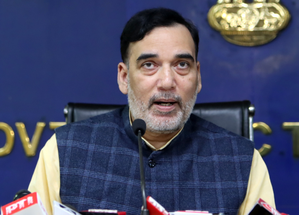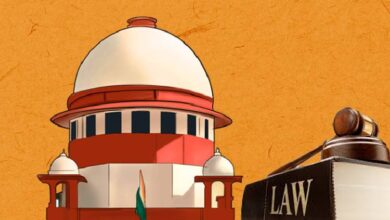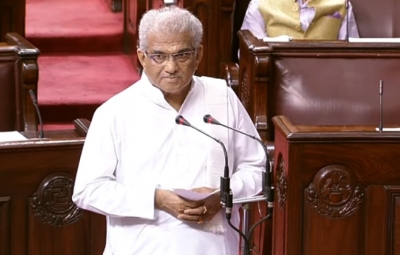‘Governors must act before matter comes to SC’, says CJI on Punjab govt’s plea
New Delhi, Nov 6: The Supreme Court on Monday observed that Governors in states must act even before the matter comes to the apex court.
“This has to come to an end when the Governors act only when matters reach the Supreme Court,” CJI D.Y. Chandrachud said while hearing the Punjab government’s plea against Governor Banwarilal Purohit for delay in granting assent to bills passed by the Assembly.
A bench of Chief Justice D.Y. Chandrachud, Justices J.B. Pardiwala, and Manoj Misra heard the plea, which also sought directions to the governor to clear all pending bills that have been passed by the Assembly.
Senior Advocate Abhishek Manu Singhvi appearing for the Punjab government said the four bills were sent to the Governor on June 26. The letter was sent by the Governor to CM Mann raising objection to the convening of the session.
“From July- matters like fiscal bills, etc., were not passed for four months,” he told the court.
However, the CJI pointed out that SG Tushar Mehta is saying that the Governor has taken action. SG Mehta said that certain astonishing things have never happened before in two states.
The CJI further pointed out that this happened in another state also.
“Why does the party have to come to the Supreme Court? The Governor has to pass the bills.”
Singhvi, who had earlier appeared for the state of Telangana, said, “We came and then the Governor passed the bill”.
“You come to the Supreme Court then the Governor starts acting. This shouldn’t be,” the CJI said.
Observing that both the governments and the Governors need to do some soul-searching, the CJI asked, “Why should parties be required to move to the Supreme Court to convene the budget session?… These are matters to be decided by the Governor and CM.”
Senior Advocate Venugopal requested the court to take up Kerala’s case along with the current one.
“Kerala Assembly has passed three bills, the Governor has kept three bills pending for two years now… would your lordships have that along with this?”
On this the CJI, however, said that in the routine cause these matters are listed as soon as possible.
On Punjab’s plea, the CJI said that it is stated that the bills have not been dealt with by the Governor in the manner required by Art 200. In two bills the Governor has taken action. Senior Advocate Singhvi submitted that the ground taken by the Governor was that the Vidhan Sabha ought to have been prorogued on March 22 and thereafter reconvened.
“As per Rule 16 of rules governing Vidhan Sabha, the session was adjourned sine die and then reconvened. SG Mehta stated that the Governor has taken appropriate action and will file an updated status report. This court shall be apprised of the same on Friday,” the CJI said.
The state of Punjab in its plea had said such “unconstitutional inaction” has brought the entire administration to a “grinding halt”. Saying that the Governor cannot indefinitely sit over the bills as he has restricted powers under Article 200 of the Constitution, the state reached the top court.
Purohit has been involved in a running feud with the Aam Aadmi Party (AAP) government led by Chief Minister Bhagwant Mann.
On November 1, the Governor gave his approval to two of the three bills sent to him, days after he wrote to Mann, saying he would examine all the proposed laws on merit before allowing those to be tabled in the Assembly.
The Governor’s approval is required to table money bills in the House.
Purohit has approved the Punjab Goods and Services Tax (Amendment) Bill, 2023 and the Indian Stamp (Punjab Amendment) Bill, 2023. But in his letter to the chief minister on October 19, the Governor withheld his approval to three money bills.
He earlier withheld his approval of the Punjab Fiscal Responsibility and Budget Management (Amendment) Bill, 2023, the Punjab Goods and Services Tax (Amendment) Bill, 2023, and the Indian Stamp (Punjab Amendment) Bill, 2023, which were to be tabled in the Assembly during the October 20-21 session.
The Governor had said the October 20-21 session, which was projected as an extension of the budget session, was “bound to be illegal” and any business conducted during it “unlawful”. On October 20, the Punjab government had cut short its two-day session.
CM Mann had then said that his government would move the apex court against the Governor’s conduct.
Earlier, the Punjab government had moved the Supreme Court after accusing the Governor of not “reverting” to the cabinet’s decision of summoning the budget session in March.
The Sikh Gurdwaras (Amendment) Bill, 2023, the Punjab Universities Laws (Amendment) Bill, 2023, the Punjab Police (Amendment) Bill, 2023, and the Punjab Affiliated Colleges (Security of Service) Amendment Bill, 2023 are still awaiting the Governor’s assent. These bills were passed during the June 19-20 session of the Punjab Assembly, which the Governor had called “patently illegal”.






